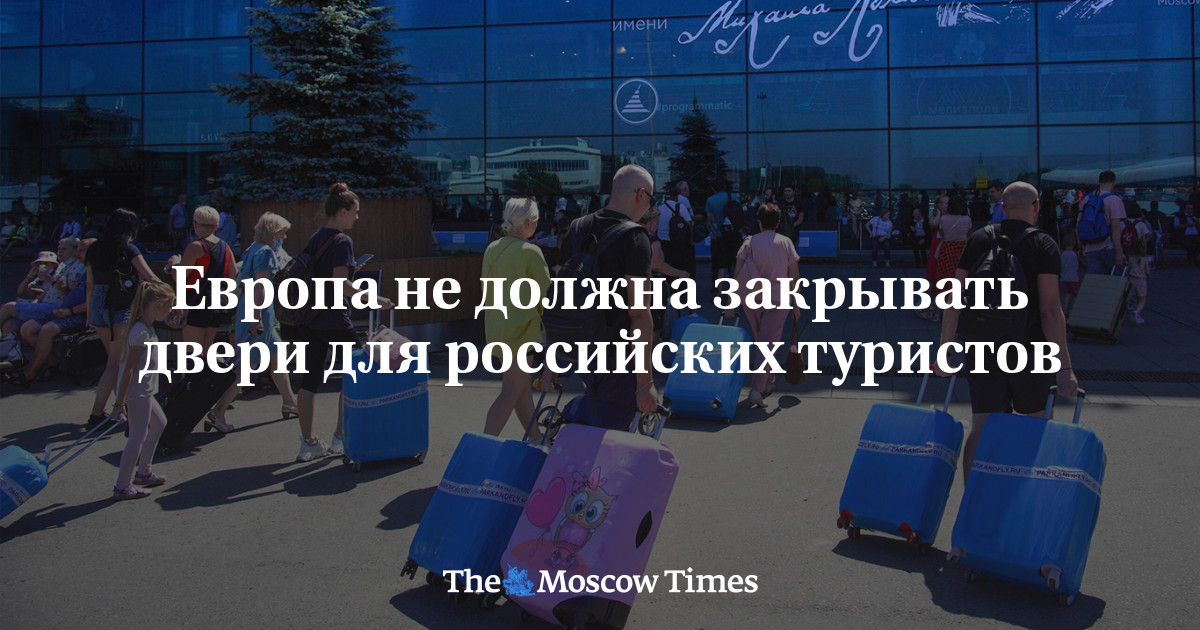The sight of Russian tourists, often wealthy, shopping in European cities or relaxing on its beaches may seem sharply at odds with efforts to isolate Moscow’s leadership and weaken Russia’s economy over its horrific aggression against Ukraine. Several countries in Northern and Central Europe have restricted the entry of Russians and are pushing to ban visas for Russian tourists throughout the EU. Ukrainian President Vladimir Zelensky also called for blocking the issuance of visas, with the exception of humanitarian ones. This impulse is understandable, but a ban would be a mistake.
While sanctions aimed at diminishing Vladimir Putin’s ability to wage war would inevitably affect (and have already affected) ordinary Russians, they were not aimed at them directly. Even the bans on Russian aircraft entering EU airspace and the supply of aircraft parts were aimed at weakening the country’s economy, and not at preventing Russians from entering Europe. The situation is different with the ban on issuing visas – this measure is aimed specifically at citizens.
And this reinforces the false Kremlin narrative that the sanctions are not really about Ukraine, but are a Western plot to overthrow Russia and its people.
Even moderate Russians may then rebel against the EU.
German Chancellor Olaf Scholz said: “This is not the war of the Russian people, this is Putin’s war.” Although Russians have repeatedly voted to elect Putin, the system he has created bombards them with pro-Kremlin propaganda and offers them few alternatives.
Previously, wherever democracies tried to isolate other authoritarian regimes, they tried to maintain contacts with civil society, for example through student exchanges, to wherever possible expose citizens to an alternative system and worldview.
Of course, tourism does not serve this purpose directly. Most Russians will not have time to interact with local residents or the media during their participation in a two-week package tour. But some will make it. Every ray of light that breaks through the thick veil of Kremlin lies is valuable.
Although reliable statistics are scarce, it is estimated that several hundred thousand Russians have fled their country since the start of the war out of concern or protest about what was happening. Many of them are young and well-qualified, a brain drain that will add to the economic blow from sanctions. Some of them will become part of a growing liberal-minded diaspora that may one day return to try to build a better post-Putin Russia. Most went to mass emigration hotspots such as Armenia, Georgia, Turkey and Dubai, but many went to the EU and initially entered on tourist visas.
Closing the tourist route will make it difficult for those who are not tourists to travel to the EU, even if work or humanitarian visas continue to be issued. One could argue that the Russians have already had six months to leave if they want. But the longer the war goes on, the more hesitant may finally head for the exit. In addition, the Kremlin may intensify repression against its own people.
EU foreign ministers will discuss the visa issue at an informal meeting in Prague this week; The EU summit could take concrete steps in October.
In the face of disagreement among member states over whether a ban on tourists visiting the Schengen zone is legally possible, one option could be to suspend the 2007 visa facilitation agreement with Russia. If you make visas more expensive, the flow of Russians will indeed decrease sharply. But it is better to leave the door open to the majority, and instead extend the bans to include officials, military and security personnel who prefer to remain part of Putin’s system.
Further sanctions may be needed to limit the Kremlin’s ability to wage brutal war. But the guiding principle should remain their focus on the military machine and the economy, and not on expelling ordinary Russians from Europe.

